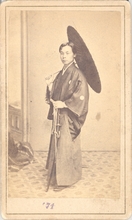The political climate in Japan in the mid-1800s was tumultuous. Japan had for hundreds of years remained closed off to the outside world. However, in 1854 when Commodore Matthew Perry arrived with “black ships” to force Japan to open up to the West, a choice had to be made. Some believed that Japan ought to remain closed and respect the centuries of tradition and culture. Others saw the military prowess of the West as evidence that Japan needed to modernize to be able to compete in the growing world. To do so, students were sent to America to study and learn from the Western way of life. One of those such students was Hatakeyama Yoshinari, who was born in the 1842 in Kagoshima, Japan. Hatakeyama was the son of a high-class samurai and was one of 15 students sent to the West to study. He assumed the name Kozo Soogiwoora to attend Rutgers College in 1868. Initially, Hatakeyama had no interest in going West but he was a committed samurai who followed orders. His mission was to learn about the military and technology advancements in the West so that he could help bring his clan forward. During his time at Rutgers, he became quite comfortable as the Japanese community in New Brunswick grew. He eventually converted to Christianity and studied closely under Professor Edward Corwin. Hatakeyama faced financial difficulties that might have caused him to leave his studies at Rutgers, however, he managed to get support from the Dutch Reformed Church. As the number of Japanese students grew in New Brunswick, Hatakeyama became an unofficial leader. He taught his fellow Japanese students about living life in the West and helped them find places to stay. In 1871, Hatakeyama had to leave Rutgers to translate for the Iwakura Mission. He returned to Japan in 1873 and became an officer in the Japanese Government Departments of the Interior, Education and Foreign Affairs. He then went on to become director of Imperial University at Tokyo. Overall, Hatakeyama was an influential figure. His development from someone who had no interest in the West to someone who grew fond of Rutgers shows great growth. When he returned to Japan, he brought with him an appreciation of what he had learned in America and was able to establish himself as a strong leader and a valuable member of Japanese society.
